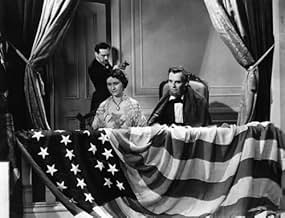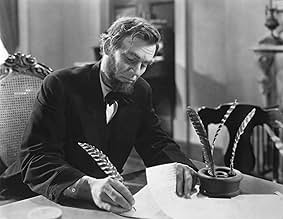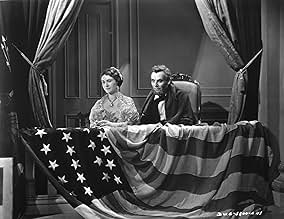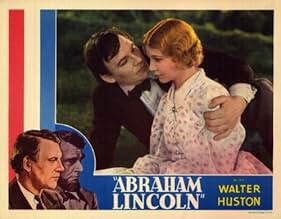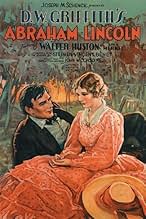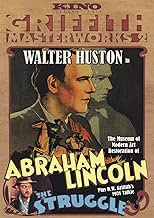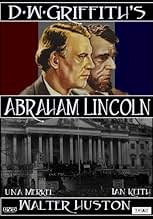IMDb रेटिंग
5.6/10
1.8 हज़ार
आपकी रेटिंग
अपनी भाषा में प्लॉट जोड़ेंAn episodic biography of the 16th President of the United States.An episodic biography of the 16th President of the United States.An episodic biography of the 16th President of the United States.
William L. Thorne
- Tom Lincoln
- (as W.L. Thorne)
Edgar Dearing
- Armstrong
- (as Edgar Deering)
Jason Robards Sr.
- Herndon
- (as Jason Robards)
Cameron Prud'Homme
- John Hay - Secretary to the President
- (as Cameron Prudhomme)
James Eagles
- Young Soldier
- (as Jimmie Eagle)
कहानी
क्या आपको पता है
- ट्रिवियाThis was D.W. Griffith's first sound film. Abraham Lincoln (1930) was also the first sound film about the Civil War which veterans of that war could view.
- गूफ़In both the Union and Confederate parades, the musicians play trombones with forward facing bells. During the Civil War, the bells faced backwards.
- भाव
[death scene]
Ann Rutledge: I know the truth, dear. It's goodbye.
Abraham Lincoln: No, no, Ann, dear. You're not going to leave me. I won't let you!
Ann Rutledge: We must be brave, dear...
[looking up to the heavens]
Ann Rutledge: Don't take me away. Don't take me away! It's so dark and lonesome!
Abraham Lincoln: Ann, you mustn't let go.
Ann Rutledge: If they'd sing, I wouldn't be so afraid.
[a chorus of "Sweet By and By" swells up in the background]
Ann Rutledge: We will meet there, dear.
- इसके अलावा अन्य वर्जनOriginally, this film was color-tinted in sepia-tone, with blue for night scenes. These prints also had a prologue. Current public-domain prints are in black and white, minus the prologue with a shorter running time.
- कनेक्शनEdited into General Spanky (1936)
- साउंडट्रैकBattle Hymn of the Republic
(ca 1856) (uncredited)
Music by William Steffe
Lyrics by Julia Ward Howe (1862)
Played during the opening credits and often in the score
Sung by an offscreen chorus during a civil war scene
फीचर्ड रिव्यू
ABRAHAM LINCOLN (United Artists, 1930), directed by movie pioneer D.W.
Griffith, is an interesting antique, being Griffith's first of two
ventures in talking pictures.
This movie about an American president is more of Griffith's style, in spite that his technique in movie directing has become passé since the start of the roaring twenties. Handicapped by its slow pacing, Walter Huston gives a very fine performance in his title role, with Kay Hammond somewhat satisfactory as his wife and later first lady, Mary Todd Lincoln, along with Ian Keith adding fine support with his few scenes as John Wilkes Booth, a crazed stage actor who puts an end to Lincoln's life on that tragic day of April 14, 1865. However, it is Una Merkel as Ann Rutledge, Lincoln's true love interest in the early portion of the story, whose performance weakens the film. This capable actress might have made a go with her role if it weren't for some bad dialog she recites, such as responding to Lincoln following his proposal to her, "Yes, Abe. You've got your gingerbread." Then there are Griffith screen veterans of the silent era, Henry B. Walthall as Colonel Marshall; Hobart Bosworth as General Robert E. Lee; and the great character actress, Lucille LaVerne, the spiteful old hag in ORPHANS OF THE STORM (1921) appearing in an opening scene as Mrs. Lincoln's midwife. Her raspy voice fits her personality to a "T".
With the screenplay by Stephen Vincent Benet, this epic biography with episodic events opens with the birth of a great man, Abraham Lincoln, on February 12, 1809. Moments later viewers find the infant now "the ugliest and smartest man in New Salem" clerking at Denton Offut's general store, his romance with young Ann Rutledge who later dies, and functioning as a young lawyer. After he meets Mary Todd at a society ball, the scene shifts to Lincoln as a bridegroom having second thoughts about attending his own wedding. He eventually marries her. Move forward to the 1860 Lincoln-Douglas (E. Alyn Warren) debate, which, as seen on screen, is not much of a debate but just two participants delivering a few words of dialog each. Lincoln wins the presidency and is soon faced with his long battle with the Civil War and placing Colonel Ulysses S. Grant (Fred Warren) in charge to put an end to it. After the end of the war, 1865, Lincoln wins his second term election, but doesn't live to fulfill it.
Originally released in theaters at 97 minutes, ABRAHAM LINCOLN in recent years has become a public domain title distributed by various video companies, most presenting bad copies with shorter lengths, many cut down to about 84 minutes, some eliminating scenes with Lincoln heading over towards the cemetery during a thunder storm crying over Ann's grave; another involving Lincoln tender moments with his youngest son, Tad (Gordon Thorpe). After coming across these inferior copies in video stores, I've managed to locate an excellent and more accurate video copy in 1986, compliments of Blackhawk Video. Not only was the video print clear in both visuals and sound, it included restored events eliminated from reissue copies, the ones that had played on Arts and Entertainment channel, Turner Classic Movies (where it made its debut March 8, 2007) and many public television stations during the late night hours. Reissue prints begin with a view of a log cabin and sound track of whistling winds superimposed with the title of February 12, 1809. In the nearly restored 93 minute video copy, it begins with a five minute prologue done in the silent film tradition showing slaves being shipped to the United States followed by other historic events and conversations amongst various politicians (one of them played by Henry Kolker), before shifting towards the event of Lincoln's birth in a log cabin. There are other silent sequences interacted into the story later on, as well as some off screen singing in the sound track not shown in the edited versions.
It's been said that ABRAHAM LINCOLN was a financial and critical success upon release. By today's standards, it hasn't stood the test of time. Future retelling on Lincoln's life, YOUNG MR. LINCOLN (1939) with Henry Fonda, and ABE LINCOLN IN ILLINOIS (1940), with Raymond Massey, are both excellent in their own way and continue to hold interest. However, Griffith's adaptation is the only one of the three mentioned to focus on the Civil War. Regardless of its handicaps, Griffith's first talkie on the life of Lincoln has some interesting moments, but otherwise it's a rather dull affair. Worth viewing for history buffs, but aside from Lincoln's frequent remark, "The union must be preserved," don't expect an accurate history lesson out of this. (**1/2)
This movie about an American president is more of Griffith's style, in spite that his technique in movie directing has become passé since the start of the roaring twenties. Handicapped by its slow pacing, Walter Huston gives a very fine performance in his title role, with Kay Hammond somewhat satisfactory as his wife and later first lady, Mary Todd Lincoln, along with Ian Keith adding fine support with his few scenes as John Wilkes Booth, a crazed stage actor who puts an end to Lincoln's life on that tragic day of April 14, 1865. However, it is Una Merkel as Ann Rutledge, Lincoln's true love interest in the early portion of the story, whose performance weakens the film. This capable actress might have made a go with her role if it weren't for some bad dialog she recites, such as responding to Lincoln following his proposal to her, "Yes, Abe. You've got your gingerbread." Then there are Griffith screen veterans of the silent era, Henry B. Walthall as Colonel Marshall; Hobart Bosworth as General Robert E. Lee; and the great character actress, Lucille LaVerne, the spiteful old hag in ORPHANS OF THE STORM (1921) appearing in an opening scene as Mrs. Lincoln's midwife. Her raspy voice fits her personality to a "T".
With the screenplay by Stephen Vincent Benet, this epic biography with episodic events opens with the birth of a great man, Abraham Lincoln, on February 12, 1809. Moments later viewers find the infant now "the ugliest and smartest man in New Salem" clerking at Denton Offut's general store, his romance with young Ann Rutledge who later dies, and functioning as a young lawyer. After he meets Mary Todd at a society ball, the scene shifts to Lincoln as a bridegroom having second thoughts about attending his own wedding. He eventually marries her. Move forward to the 1860 Lincoln-Douglas (E. Alyn Warren) debate, which, as seen on screen, is not much of a debate but just two participants delivering a few words of dialog each. Lincoln wins the presidency and is soon faced with his long battle with the Civil War and placing Colonel Ulysses S. Grant (Fred Warren) in charge to put an end to it. After the end of the war, 1865, Lincoln wins his second term election, but doesn't live to fulfill it.
Originally released in theaters at 97 minutes, ABRAHAM LINCOLN in recent years has become a public domain title distributed by various video companies, most presenting bad copies with shorter lengths, many cut down to about 84 minutes, some eliminating scenes with Lincoln heading over towards the cemetery during a thunder storm crying over Ann's grave; another involving Lincoln tender moments with his youngest son, Tad (Gordon Thorpe). After coming across these inferior copies in video stores, I've managed to locate an excellent and more accurate video copy in 1986, compliments of Blackhawk Video. Not only was the video print clear in both visuals and sound, it included restored events eliminated from reissue copies, the ones that had played on Arts and Entertainment channel, Turner Classic Movies (where it made its debut March 8, 2007) and many public television stations during the late night hours. Reissue prints begin with a view of a log cabin and sound track of whistling winds superimposed with the title of February 12, 1809. In the nearly restored 93 minute video copy, it begins with a five minute prologue done in the silent film tradition showing slaves being shipped to the United States followed by other historic events and conversations amongst various politicians (one of them played by Henry Kolker), before shifting towards the event of Lincoln's birth in a log cabin. There are other silent sequences interacted into the story later on, as well as some off screen singing in the sound track not shown in the edited versions.
It's been said that ABRAHAM LINCOLN was a financial and critical success upon release. By today's standards, it hasn't stood the test of time. Future retelling on Lincoln's life, YOUNG MR. LINCOLN (1939) with Henry Fonda, and ABE LINCOLN IN ILLINOIS (1940), with Raymond Massey, are both excellent in their own way and continue to hold interest. However, Griffith's adaptation is the only one of the three mentioned to focus on the Civil War. Regardless of its handicaps, Griffith's first talkie on the life of Lincoln has some interesting moments, but otherwise it's a rather dull affair. Worth viewing for history buffs, but aside from Lincoln's frequent remark, "The union must be preserved," don't expect an accurate history lesson out of this. (**1/2)
टॉप पसंद
रेटिंग देने के लिए साइन-इन करें और वैयक्तिकृत सुझावों के लिए वॉचलिस्ट करें
- How long is Abraham Lincoln?Alexa द्वारा संचालित
विवरण
- रिलीज़ की तारीख़
- कंट्री ऑफ़ ओरिजिन
- भाषा
- इस रूप में भी जाना जाता है
- D.W. Griffith's Abraham Lincoln
- उत्पादन कंपनियां
- IMDbPro पर और कंपनी क्रेडिट देखें
- चलने की अवधि1 घंटा 36 मिनट
- रंग
- पक्ष अनुपात
- 1.20 : 1
इस पेज में योगदान दें
किसी बदलाव का सुझाव दें या अनुपलब्ध कॉन्टेंट जोड़ें


